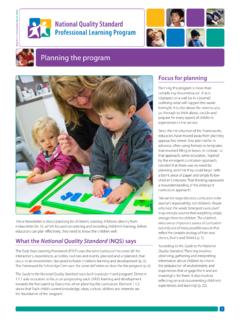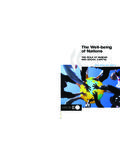Transcription of EARLY LEARNING - OECD.org
1 EARLY LEARNINGMATTERSE arly LEARNING MattersThis work is published under the responsibility of the Secretary-General of the OECD. The opinions expressed and arguments employed herein do not necessarily reflect the official views of OECD member countries. This document and any map included herein are without prejudice to the status of or sovereignty over any territory, to the delimitation of international frontiers and boundaries and to the name of any territory, city or credits: Cover: Monkey Business Images / Shutterstock OECD 2018 You can copy, download or print OECD content for your own use, and you can include excerpts from OECD publications, databases and multimedia products in your own documents, presentations, blogs, websites and teaching materials, provided that suitable acknowledgement of OECD as source and copyright owner is given. All requests for public or commercial use and translation rights should be submitted to Requests for permission to photocopy portions of this material for public or commercial use shall be addressed directly to the Copyright Clearance Centre (CCC) at or the Centre fran ais d'exploitation du droit de copie (CFC)
2 At of contents The International EARLY LEARNING and Child Well-being Study EARLY years are the most formative period in life Children's environment has a critical role in their development Family plays a central role A STRONG START MAKES A DIFFERENCE THE SHIFTING ROLE OF ECEC ECEC can benefit children in the long term A strong EARLY start gives children an advantage Better quality leads to better outcomes Disadvantaged children can benefit significantly INTERNATIONAL EARLY LEARNING AND CHILD WELL-BEING STUDY Impetus for the study Key benefits The focus of the study A robust design TimelineCONTACT INFO EARLY LEARNING MATTERS OECD 2018 - 3_____Page 6 Page 6 Page 7 Page 7 Page 9 Page 9 Page 10 Page 10 Page 12 Page 14 Page 14 Page 15 Page 15 Page 16 Page 18 Page 19 Page 20 FIND OUT MORE ABOUT OECD WORK FiguresThe International EARLY LEARNING and Child Well-being Study The brain's ability to change and the amount of effort required for such change 4 - EARLY LEARNING MATTERS OECD 2018 _____Figure 1 Figure 2 Figure 3 Figure 4 Figure 5 Figure 6 Figure 7 Figure 8 Figure 9 Figure 10 Figure 11 Figure 12 Figure 13 Figure 14 Relationship between participation in ECEC programmes and reading performance at age 15 throughout different PISA cycles Impact of the home LEARNING environment on children's English and mathematics attainment at age 11 Impact of contextual factors on children's literacy at age 5 Contextual factors influencing a child's EARLY LEARNING Relationship between duration of ECEC participation and student performance at age 15 Influence of quality and quantity of ECEC programmes on children's literacy Relationship between participation in ECEC and students' science scores across countries Long-term consequences of participation in the Perry
3 Pre-school Programme Impact of participation in ECEC programmes on PISA science scores for native and immigrant children Conceptual model of children's EARLY LEARNING The four EARLY LEARNING domains assessed in the study Age starting ECEC and science proficiency by socio-economic status (SES) Ensuring child well-being in the studyPage 6 Page 7 Page 7 Page 8 Page 9 Page 10 Page 10 Page 11 Page 12 Page 12 Page 13 Page 14 Page 15 Page 16 The International EARLY LEARNING and Child Well-being Study EARLY LEARNING MATTERS OECD 2018 - 5 Foreword _____The imperative to give all children a strong EARLY start is more and more pressing. Children s EARLY experiences have aprofound and long-lasting impact on individual children s well-being and happiness during childhood, as well as their laterlife outcomes, including education, employment, health, citizenship and life satisfaction. Countries that fail to payattention to the quality of children s EARLY years are ignoring the most effective means to assure the well-being and skills ofthe next generation and to achieve more equitable outcomes across families and communities.
4 The OECD s new study on EARLY LEARNING and Child Well-being helps countries to better understand and improve the earlyexperiences of their youngest citizens. It is the first OECD education study designed from the outset with a deliberatebalance across children s social and emotional development and their EARLY cognitive skills. The study helps countries tolearn from each other on what helps and what hinders positive EARLY development across this holistic set of skills. Giventhe diversity of approaches within and across countries in EARLY childhood education and care, as well as other EARLY yearsinterventions, this work will add considerable value to education leaders and practitioners over the coming years, as wellas to children and their families who benefit from improved services and outcomes. Providing more EARLY childhood education and care (ECEC) does not automatically yield positive results for children.
5 Insome countries, ECEC has very positive effects on children s LEARNING outcomes, whereas in other countries it is neutral andeven negative in some cases. Equally worrying, in a number of countries ECEC appears to benefit advantaged childrenmore than disadvantaged children. Without reliable data countries cannot know whether and to what extent their policiesare improving or exacerbating equity amongst children. The countries that initiated the EARLY LEARNING and Child Well-being study wish to improve outcomes for children,especially the most disadvantaged children. These countries are concerned about uneven quality of provision within theircountries and the poor measures available to them to assess quality. They are also aware that children have differentneeds. Thus, to achieve equitable outcomes, differentiated services may be necessary. Having reliable, valid andcomparable outcome data is helping these countries to have confidence they are improving outcomes for all children.
6 Andreas Schleicher Director for the Directorate for Education and Skills Special Advisor on Education Policy to the Secretary-General The International EARLY LEARNING and Child Well-being Study 6 - EARLY LEARNING MATTERS OECD 2018A strong start makes a difference_____The first five years of children s lives are crucial to their development. During this period, children learn at a faster rate than at any other time in their lives, developing basic cognitive and socio-emotional skills that are fundamental for their future achievements in school and later on as an adult. These skills are also the foundation for their general well-being how they cope with future successes and setbacks, professionally and in their personal lives. And in order to foster this development, children require ongoing interaction with, and care and attention from their parents and other caregivers. For this reason, EARLY childhood education and care (ECEC) also plays an important role.
7 Research findings show that high quality ECEC programmes provide long-term benefits for both cognitive and socio-emotional skills, prompting many countries to increase the number of such programmes in recent decades. Moreover, there is growing interest in enhancing the quality of ECEC programmes and children s home environments in order to give every child a strong start EARLY on. The OECD has launched the International EARLY LEARNING and Child Well-being Study, recognising the impact that children s EARLY LEARNING has on later life outcomes. The goal of the study is to provide robust empirical data on children s EARLY LEARNING through a broad scope of domains that comprise cognitive and social and emotional development. But even more importantly, it aims to identify factors that foster and hinder children s EARLY LEARNING , both at home and in ECEC programmes. The findings from this study will assist countries to better support children s EARLY development, improving their life chances and long- term well-being.
8 EARLY YEARS ARE THE MOST FORMATIVE PERIOD IN LIFER esearch continuously shows that the brain develops at an astonishing rate during a child s EARLY years, and is at its highest levels of plasticity than at any other point in our lifetime. As a consequence, during this period, children are especially sensitive to external stimuli, such as the types of interactions they have with their caregivers. Thus, the EARLY years are a time of rapid cognitive, linguistic, social, emotional and motor development. But, with age, these LEARNING capacities slow down and the amount of effort it takes to learn new skills increases (Figure 1). FIGURE 1 THE BRAIN'S ABILITY TO CHANGE AND THE AMOUNT OF EFFORT REQUIRED FOR SUCH CHANGES ource: Levitt (2009), From Best Practices to Breakthrough Impacts: A Science-Based Approach to Building a More Promising Future for Young Children andFamilies, Center on the Developing Child, Harvard University, Cambridge, International EARLY LEARNING and Child Well-being Study EARLY LEARNING MATTERS OECD 2018 - 7_____Yet, the extraordinary plasticity of children s brains is not sufficient to ensure that EARLY LEARNING actually occurs.
9 The foundation for LEARNING and continuous development depends on a nurturing and stimulating environment provided by family, ECEC services and the wider community (Figure 2). CHILDREN'S ENVIRONMENT HAS A CRITICAL ROLE IN THEIR DEVELOPMENTFIGURE 2 CONTEXTUAL FACTORS INFLUENCING A CHILD'S EARLY LEARNINGS ource: Adapted from OECD (2015), Skills for Social Progress: The Power of Social and Emotional Skills, OECD Skills Studies, OECD Publishing, PLAYS A CENTRAL ROLEW hile various factors influence children s LEARNING , the home LEARNING environment shapes their development the most (Figure 3). Families play a central nurturing and educational role, enriching their children s development through the activities they do together and other aspects of their home environment. IMPACT OF CONTEXTUAL FACTORS ON CHILDREN'S LITERACY AT AGE 5 FIGURE 3 Note: Effect size compares the relative strength of different factors that influence children s literacy proficiency at age 5.
10 It is expressed in the units of standarddeviations where an effect of is relatively weak, one of is moderately strong, and an effect of is strong. Source: Melhuish, E. et al., (2008), Effects of the home LEARNING environment and preschool center experience upon literacy and numeracy development inearly primary school , Journal of Social Issues, No. 64, pp. SERVICESCOMMUNITYHome activities Parental backgroundParenting stylesCivic & cultural activitiesPublic servicesSafetyCurricular & extra-curricular activitiesPeer relationsThe International EARLY LEARNING and Child Well-being Study 8 - EARLY LEARNING MATTERS OECD 2018_____The family s influence is even stronger during a child s first two years, when children need almost constant care, supervision, and timely and stimulating interaction. Children who experience fewer interactions with their parents ( reading with children, number/letter activities, going to the library, painting and drawing, etc.)

















